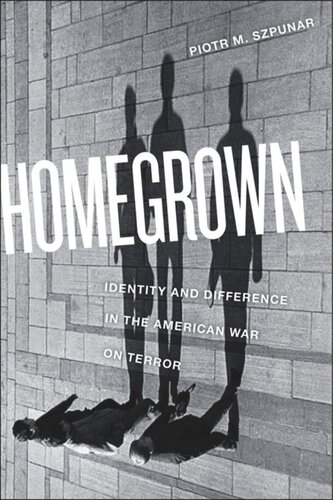

Most ebook files are in PDF format, so you can easily read them using various software such as Foxit Reader or directly on the Google Chrome browser.
Some ebook files are released by publishers in other formats such as .awz, .mobi, .epub, .fb2, etc. You may need to install specific software to read these formats on mobile/PC, such as Calibre.
Please read the tutorial at this link: https://ebookbell.com/faq
We offer FREE conversion to the popular formats you request; however, this may take some time. Therefore, right after payment, please email us, and we will try to provide the service as quickly as possible.
For some exceptional file formats or broken links (if any), please refrain from opening any disputes. Instead, email us first, and we will try to assist within a maximum of 6 hours.
EbookBell Team

4.4
12 reviewsAn insightful study of how identity is mobilized in and for war in the face of homegrown terrorism.
“You are either with us, or against us” is the refrain that captures the spirit of the global war on terror. Images of the “them” implied in this war cry—distinct foreign “others”—inundate Americans on hit television shows, Hollywood blockbusters, and nightly news. However, in this book, Piotr Szpunar tells the story of a fuzzier image: the homegrown terrorist, a foe that blends into the crowd, who Americans are told looks, talks, and acts “like us.”
Homegrown delves into the dynamics of domestic counterterrorism, revealing the complications that arise when the terrorist threat involves Americans, both residents and citizens, who have taken up arms against their own country. Szpunar examines the ways in which identities are blurred in the war on terror, amid debates concerning who is “the real terrorist.” He considers cases ranging from the white supremacist Sikh Temple shooter,,to the Newburgh Four, ex-convicts caught up in an FBI informant-led plot to bomb synagogues, to ecoterrorists, to the Tsarnaev brothers responsible for the Boston Marathon bombing.
Drawing on popular media coverage, court documents, as well as “terrorist”-produced media, Szpunar poses new questions about the strategic deployment of identity in times of conflict. The book argues that homegrown terrorism challenges our long held understandings of how identity and difference play out in war—beyond “us versus them”—and, more importantly, that the way in which it is conceptualized and combatted has real consequences for social, cultural, and political notions of citizenship and belonging. The first critical examination of homegrown terrorism, this book will make you question how we make sense of the actions of ourselves and others in global war, and the figures that fall in between.